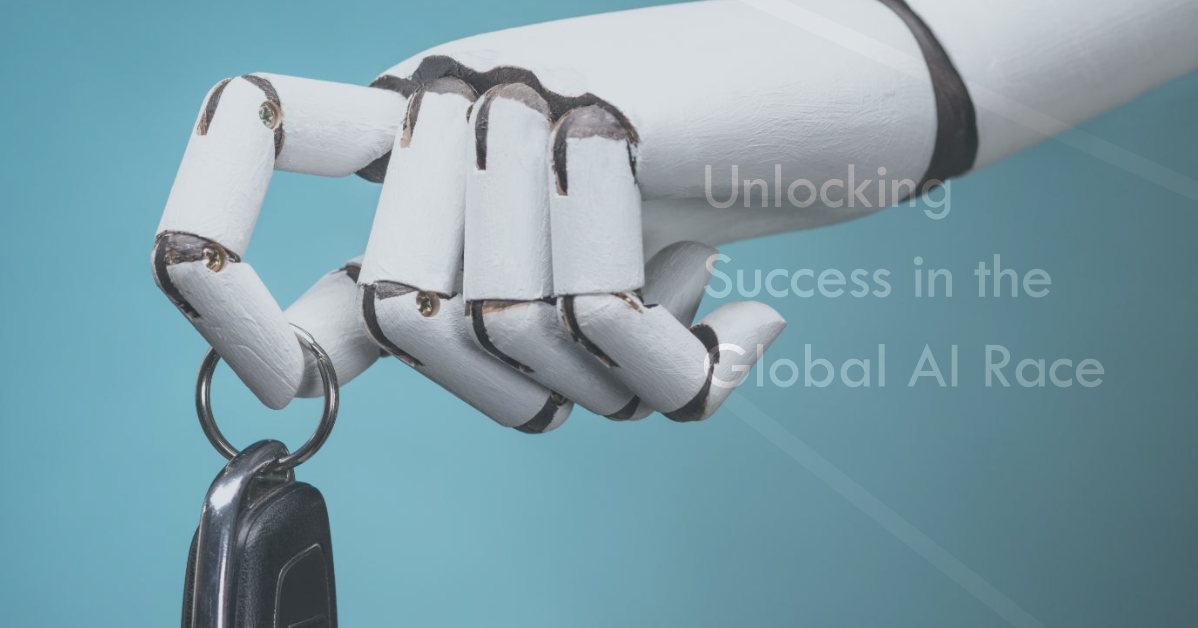Unlocking Success: The Key to Winning the Global AI Race
In the ever-evolving landscape of artificial intelligence (AI), success depends on understanding and harnessing the human element. In this blog, we explore the pivotal role of humanization in the Global AI Race, shedding light on essential strategies, key insights, and the power of collaboration. Discover how to unlock success in AI by combining technology with empathy, ethics, and innovation.

The Global AI Race
Artificial intelligence has taken the world by storm, transforming industries, economies, and societies. The Global AI Race represents a fierce competition among nations, organizations, and individuals to harness the potential of AI for economic, strategic, and social advantage. It's a race to develop cutting-edge AI technologies, achieve breakthroughs in research, and secure a leading position in the AI-driven future.
However, amidst the excitement and frenzy, it's easy to overlook a crucial element that can make or break this race: humanity. As we delve into the intricacies of the Global AI Race, let's uncover why humanization is the key to unlocking success.
The Power of Collaboration
One of the defining aspects of the Global AI Race is the global collaboration among scientists, researchers, and engineers. While AI is often viewed as a technological endeavor, its true power lies in interdisciplinary collaboration. It's the marriage of computer science, neuroscience, psychology, ethics, and various other fields that propels AI forward.
In a race where collaboration is key, humanization becomes a critical factor. Teams that combine technical expertise with empathy, communication skills, and ethical considerations are more likely to produce AI systems that benefit humanity. Cross-disciplinary teams bring fresh perspectives, challenge biases, and ensure that AI solutions are designed with people in mind.
Ethical AI: The Moral Imperative
As the Global AI Race intensifies, concerns about the ethical implications of AI have gained prominence. Biases in AI algorithms, discriminatory AI applications, and ethical dilemmas surrounding AI-driven decisions have all raised red flags. To win this race, it's essential to prioritize ethical AI development.
Ethical considerations humanize AI by ensuring that it aligns with societal values and respects individual rights. Technologies that respect diversity, promote fairness, and prioritize transparency are more likely to gain public trust and regulatory approval. In the long run, ethical AI is not just a moral imperative but also a strategic advantage.
Embracing AI for Good
Beyond the competitive aspect, the Global AI Race offers an opportunity to harness AI for the greater good. Humanization in AI means using technology to address pressing global challenges, such as healthcare, climate change, poverty, and education.
When AI is employed as a force for positive change, it not only improves lives but also fosters international collaboration. The race to use AI for good transcends borders and ideologies, uniting nations in a common goal of addressing humanity's most significant challenges.
Empathy and User-Centric Design
In the race to create cutting-edge AI applications, it's easy to lose sight of the end-users—people. Success in AI requires a deep understanding of user needs, preferences, and pain points. This is where empathy comes into play.
Empathetic AI design ensures that AI systems are intuitive, user-friendly, and capable of addressing real-world problems. Whether it's a chatbot that understands emotions or a recommendation system that respects user privacy, AI solutions that prioritize empathy enhance user experiences and stand a better chance of success.
Innovation Through Diversity
The Global AI Race is not just a technical competition; it's a race of ideas. To win, we must harness the power of diverse perspectives. A diverse team brings together people from different backgrounds, cultures, and experiences. This diversity fuels innovation and helps AI systems better understand and serve a global audience.
Inclusivity and diversity are not only ethical imperatives but also strategic advantages in the AI race. Diverse teams are more likely to identify new use cases, spot biases, and create AI solutions that resonate with a wide range of users.
Conclusion: The Human Touch in AI Success
The Global AI Race is not just about technological prowess; it's about humanity. It's about recognizing that AI, at its core, is a tool created by humans, for humans. To unlock success in this race, we must humanize AI by emphasizing collaboration, ethics, empathy, and diversity.
As we strive to win the Global AI Race, let's remember that our success is measured not only by technological achievements but also by the positive impact AI has on society. By infusing AI with the human touch, we can ensure that the AI-driven future benefits all of humanity.
- READ MORE ON:
- Diversity
- Inclusion
- Innovation
- Cultural Perspective
- User-Centric Design
- Empathetic AI
- User Experience
- Human-Centered Design
- AI for Good
- Social Impact
- Humanitarian Applications
- Sustainability
- Ethical AI
- Fairness
- Bias Mitigation
- Responsible AI
- Collaboration
- AI research
- Cross-disciplinary teams
ALSO READ
India and Italy Strengthen Maritime Heritage Collaboration
Bharat NCX 2024: India’s Cybersecurity Future with Innovation and Collaboration
Space Collaboration Critical as Orbital Traffic Intensifies
Tim Burton: Sequels and Future Collaborations with Johnny Depp
AXOR Helmets Gears Up for I.B.W. 2024 with Exciting Launches and Collaborations










